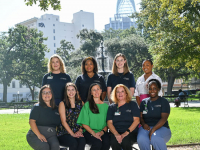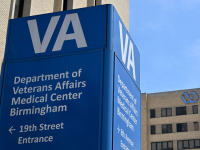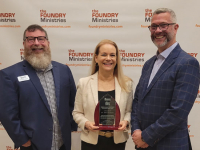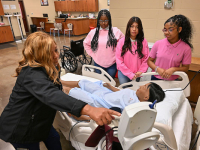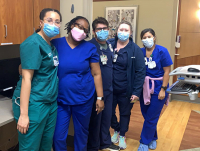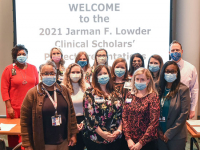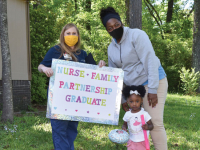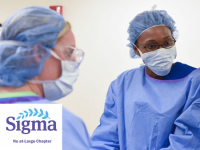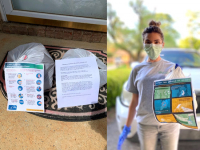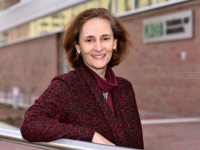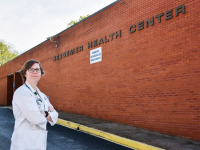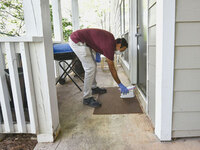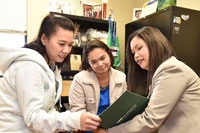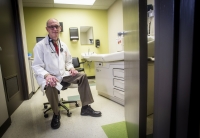In a continuing effort to serve the health care needs of medically underserved populations across Birmingham and the state of Alabama, the University of Alabama at Birmingham (UAB) School of Nursing has long partnered with community agencies and facilities to identify and assist those who struggle most to receive proper health care by providing their care through the School’s nurse-managed clinics.
Since 2013, one of those important endeavors has been the UAB School of Nursing Foundry Clinic at The Foundry Rescue Mission and Recovery Center in Bessemer, Alabama, a suburb of Birmingham. More recently, the School and its nurse practitioners (NP) from the Foundry Clinic have also partnered with Cooper Green Mercy Health Services and Aletheia House, one of Alabama’s largest providers of substance abuse treatment, substance abuse/HIV prevention, employment and housing to low-income individuals, to provide staffing and medical services at the Bessemer Neighborhood Health Center.
Now that partnership will be expanded with the selection of the Bessemer Neighborhood Health Center as a New Access Point (NAP) Federally Qualified Health Center by the Health Resources & Service Administration (HRSA). The two-year, $1.4-million grant was one of 75 awarded nationally by HRSA and one of only four awarded within Alabama.
The purpose of the NAP funding is to improve the health of the nation’s underserved communities and vulnerable populations by increasing access to comprehensive, culturally competent, quality primary health care services, something that fits well with the School’s mission to provide primary and urgent care to populations that might otherwise have no access to such care.
“This is wonderful news, particularly for our area’s homeless population, as it is the primary focus of the New Access Point funding,” said Professor and Associate Dean for Clinical and Global Partnerships Cynthia S. Selleck, PhD, RN, FNP, FAAN. “Congratulations go to all the partners involved and Chris Retan, CEO of Aletheia House, for his leadership in this effort.”
Aletheia House is a community-based organization that has been providing substance abuse treatment and prevention services to low-income individuals, and the communities in which they live, since 1972.
“We look forward to working with Aletheia House in an ever closer capacity at the Bessemer Neighborhood Health Center as ultimately, it will mean better care and increased access to care to the community,” said Melanie Baucom, MSN, CRNP, the School’s lead health care provider at both The Foundry and Bessemer Neighborhood Health Center Clinics. “Aletheia House brings a lot of resources to the table. They have been working with medically underserved populations for many years in the Bessemer area and have great experience in providing essential services such as housing and transportation, which are key to ensuring patients are able to receive the health care they need.”
The UAB School of Nursing staff strives to provide total treatment to the patients it serves at both clinics. Baucom and other UAB School of Nursing-affiliated NPs provide a full range of services including blood pressure management, diabetes management, treatment of acute illnesses, etc. Patients also have access to lab facilities and can receive help in having prescriptions filled at local pharmacies.
The partnerships with The Foundry and Aletheia House are two of several initiatives the School has undertaken in recent years to address the growing issue of lack of access to health care in many populations and regions across the state. These include:
• The Providing Access to Healthcare (PATH) Clinic at UAB Medical Towers, operated by the School in partnership with UAB Hospital and Health System, utilizes an interprofessional, team-based model to provide diabetes care at no cost to an uninsured medically underserved population discharged from UAB Hospital.
• The HRSA Heart Failure Clinic, located inside UAB Hospital in the Russell Ambulatory Center and also operated in partnership with UAB Hospital and Health System, offers guideline-directed care and education to an underserved heart failure patient population with a goal of improving access to care and reducing 30-day hospital readmission rates.
• The Graduate Nursing Education Primary Care Scholars (GNEPCS) initiative is a partnership with The Daniel Foundation of Alabama — a philanthropic organization that supports educational, health, humanitarian and cultural activities in Birmingham and throughout the state — that seeks to identify, educate and recruit students who interested in returning to work as primary care nurse practitioners in rural Alabama.
And these initiatives are experiencing tremendous success.
Additional HRSA grants totaling nearly $3 million have allowed the School to expand operations at the PATH Clinic and the HRSA Heart Failure Clinic to include mental health services for their patients and continue its partnerships with Quality of Life Health Services of Gadsden and Health Services Inc. of Montgomery to expand and increase the number of family nurse practitioners to address the needs of Alabama’s rural and underserved populations.
In 2016, the HRSA Heart Failure Clinic showed improvement across the board in the areas of population health, patient experience and cost of care. The clinic is currently the medical home for 215 heart failure patients and to date has had more than 1,000 referrals, resulting in an estimated $1.1 million in annual cost savings to the UAB Hospital and Health System.
Likewise, the PATH Clinic at UAB Medical Towers made similar strides in serving uninsured patients with diabetes. The PATH Clinic is currently the medical home to 212 patients with diabetes and has seen an estimated $500,000 in cost savings over an eight-month period.
The GNEPCS initiative has graduated 13 students with 15 more on track to graduate in 2017. Most of its graduates, including Skye Vise, MSN, CRNP, and Amy Jones, MSN, CRNP, NP-C, are practicing in rural communities and making tremendous differences. (Read more about Skye’s work in the Talladega/Munford area here.)
 The UAB School of Nursing staff that provides much-needed medical care at The Foundry Clinic and the Bessemer Neighborhood Health Center are, from left to right, Patient Services Coordinator Sonya Bumpers, Medical Assistant Dominique Horton and Nurse Practitioner Melanie Baucom.A common trait also shared by many of the initiatives is the practical, hand’s-on experience the School’s students gain through seeing patients in the School’s nurse-managed clinics. Anne Thompson, director of the Bessemer Neighborhood Health Center, believes such first-hand experience is invaluable in several ways for graduate nurse practitioner students just starting their primary care careers.
The UAB School of Nursing staff that provides much-needed medical care at The Foundry Clinic and the Bessemer Neighborhood Health Center are, from left to right, Patient Services Coordinator Sonya Bumpers, Medical Assistant Dominique Horton and Nurse Practitioner Melanie Baucom.A common trait also shared by many of the initiatives is the practical, hand’s-on experience the School’s students gain through seeing patients in the School’s nurse-managed clinics. Anne Thompson, director of the Bessemer Neighborhood Health Center, believes such first-hand experience is invaluable in several ways for graduate nurse practitioner students just starting their primary care careers.“The graduate nursing students who rotate through this clinic have an opportunity to see a health care environment in which the nurse practitioner is actually the lead health care provider onsite, which is unique,” Thompson said. “Also, the students encounter patients who are presenting with medical needs, but often have other issues as well such as addition recovery issues or homelessness.
“I believe these are very important social issues to be cognizant of and that we help the students become acquainted with those in a real-life setting, which is tremendously important.”
Selleck agreed, saying that the feedback from NP students who have worked at the School’s nurse-managed clinics has been extremely positive.
“The students have absolutely loved working with our nurse practitioners, the staff and the patients,” Selleck said. “They use their diagnostic skills a lot more and their patient education skills because the patients need a lot of health education on various topics. It turns out to be a great experience for the students and everyone involved.”
The UAB School of Nursing’s role in all of its nurse-managed clinic partnerships is vital because they provide competent, caring health care professionals who know the populations and the communities they are serving.
“We are so excited about the partnership between the Aletheia House and the UAB School of Nursing because it has allowed us to bring experienced providers into the clinic who truly understand the needs of the patients they are working with,” Retan said. “If we had to work with another group that didn’t have this knowledge, they would not understand the needs of the kinds of populations we are serving and might not provide the outstanding care that the UAB School of Nursing does.”
Retan noted that for Bessemer-area residents having access to quality health care providers and facilities such as the Bessemer Neighborhood Health Clinic and The Foundry Clinic greatly increases the likelihood patients will seek and receive the care they need.
“If people with chronic conditions can’t get to where they need to be in a convenient way they will often skip getting care and get sicker and end up needing more extensive care down the road,” Retan said. “This partnership allows us to provide the people in the greatest need access to comprehensive medical care, behavioral health care, transportation and case management.
“The people who have the greatest barriers to health care are the ones who will benefit most from this partnership.”

